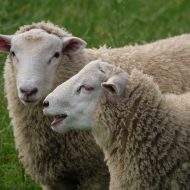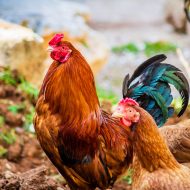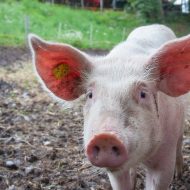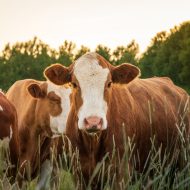Escherichia Coli (E. Coli)
E. Coli is bacteria that lives in the stomach of most animals. Cattle, pigs, sheep, goats, chickens, dogs, cats, and deer are just some of the animals that have E. Coli. Some E. Coli bacteria are not harmful, but others can cause foodborne* illness called Shiga toxin- producing E. Coli (STEC).
Overview
How can I get sick?
- Eating foods that have E. Coli on them. Some foods that commonly spread E. Coli are raw or undercooked meat, raw fruits and vegetables.
- Drinking raw or unpasteurized (straight from the animal) milk.
- Fruits and vegetables can get E. Coli on them if a person or animal poops around where the fruits and vegetables are growing.
- Drinking or swallowing water from a stream, pond, lake, or pool.
Symptoms in humans:
- Stomach pain and cramps
- Diarrhea (runny poop)
- Fever (when your body gets a little hotter than normal)
- Throwing up
- Hemolytic Uremic Syndrome (HUS)
- 5-10% of people get HUS which can be deadly and will require going to the hospital. Symptoms of HUS are:
- Not being able to pee
- Feeling very tired and not being able to sit up or stand up
- Loss of pink color in eyelids and cheeks
What can I do to stay healthy?
- Wash your hands before and after making food, after touching animals, after using the restroom and after changing baby diapers is very important.
- Proper Handwashing – Wash your hands with soap and running water for at least 20 seconds. Make sure to scrub your thumbs, between your fingers and the tops and bottoms of your hands. Dry your hands with a paper towel.
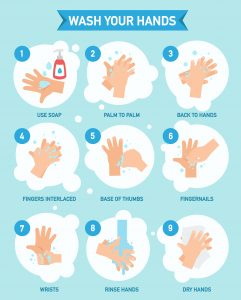
- Make sure to properly wash fruits and vegetables before eating them.
- Cook meat properly. Make sure to use a meat thermometer to make sure your meat is cooked to the proper temperature.
- Ground beef and pork should be cooked to an internal temperature of 160°F.
- Steaks and roasts should be cooked to an internal temperature of 145°F.
- Chicken should be cooked to an internal temperature of 165° F.

- Don’t let raw meat touch other things. Keep meat separate and make sure to wash surfaces that the raw meat touched like cutting boards, knives, and handles.
- Don’t drink raw milk or unpasteurized* juices and don’t drink fresh unpasteurized* ciders.
- Do not swallow water from a pool, lake, stream, pond or any other form of unfiltered water.
*Definitions:
- Foodborne illness: Caused by eating or drinking foods/drinks with germs.
- Unpasteurized: Foods that are sold in their raw form without using heat to kill germs.

Learn About Other Diseases
Click below to learn more about the many different diseases that can spread between animals and humans.
Diseases


